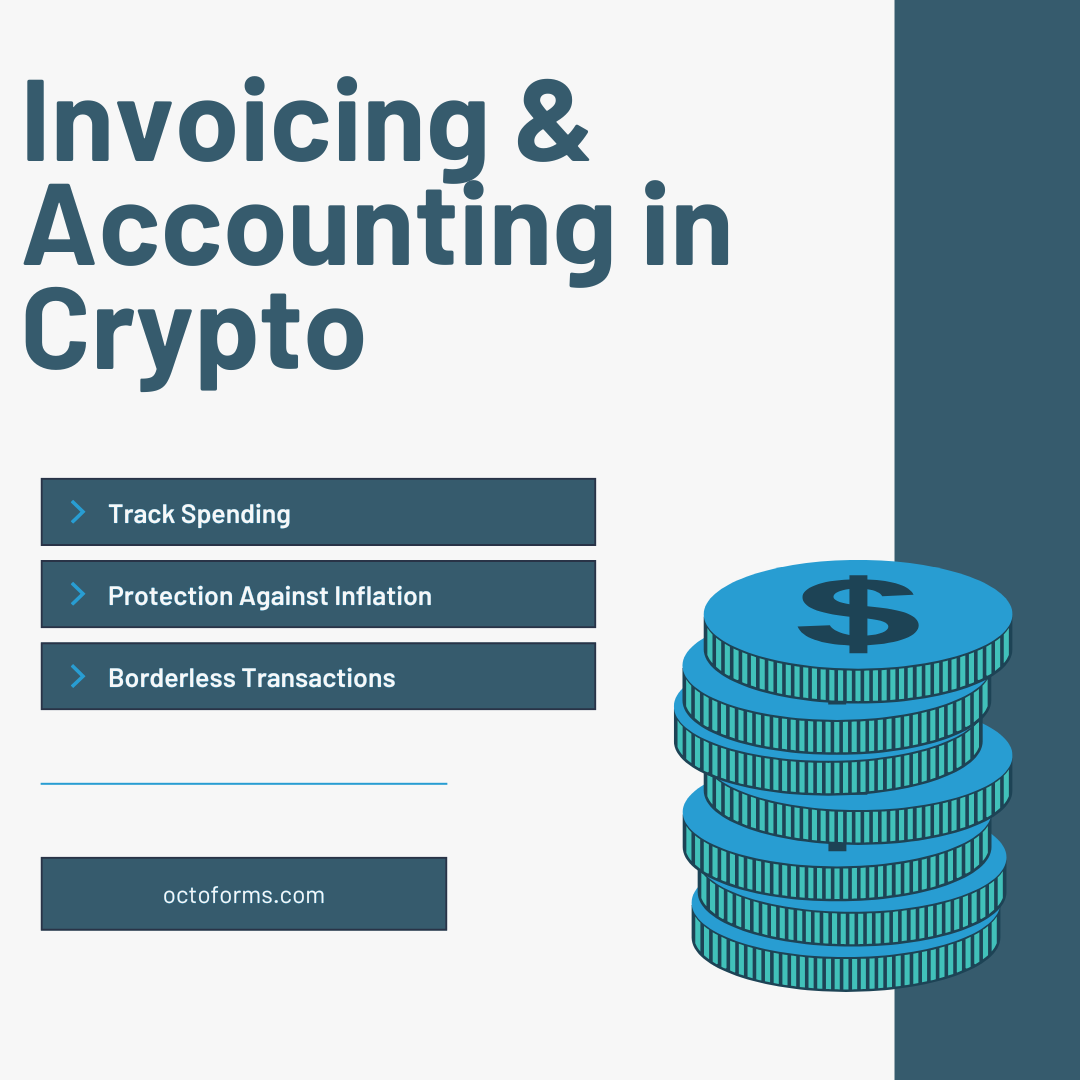As blockchain technology evolves, cryptocurrency is increasingly becoming an integral part of the financial world. One area that’s benefiting from this rise is invoicing and accounting in crypto. Businesses are recognizing the potential advantages of integrating cryptocurrency into their financial operations, especially when it comes to cross-border transactions, financial transparency, and decentralization.

Invoicing and Accounting in Crypto: Embracing the Future of Finance
Borderless Transactions and Faster Payments
Cryptocurrencies, such as Bitcoin, Ethereum, and stablecoins like USDC, facilitate borderless transactions. This allows businesses to receive payments from international clients quickly and without the friction of traditional banking systems. With crypto invoicing, there’s no need for currency conversions or lengthy bank processes. Payments can be made almost instantaneously, reducing the delays typically associated with cross-border transactions. Additionally, cryptocurrency payments can reduce transaction fees, particularly when dealing with large international transfers. The ability to bypass intermediaries (such as banks and payment processors) often results in significant savings, especially for small and medium-sized enterprises (SMEs).


Enhanced Financial Transparency
Blockchain technology underpins cryptocurrency, offering unparalleled transparency. All transactions on a blockchain are publicly recorded, immutable, and traceable. This makes it easy for businesses to verify payments, track the flow of assets, and ensure that their financial records are accurate. In accounting, this transparency is invaluable. Auditors can easily verify transactions, reducing the chances of fraudulent accounting practices. This can streamline the auditing process and enhance trust between businesses and their partners or stakeholders.
Decentralization and Control
Traditional invoicing and accounting systems often rely on centralized financial institutions. Crypto payments, on the other hand, offer businesses greater control over their finances by decentralizing the payment process. With cryptocurrencies, businesses can send and receive payments without relying on third-party services that may impose additional costs or limitations. Decentralization also allows companies to operate in areas where access to traditional banking is limited, thus opening up new markets and customer bases. It empowers businesses to transact freely, even in regions with unstable financial infrastructure.


Protection Against Inflation
Many businesses are looking to cryptocurrencies as a hedge against inflation. Unlike fiat currencies, which are subject to devaluation by governments and central banks, cryptocurrencies are often deflationary by design. Bitcoin, for example, has a capped supply of 21 million coins, making it an attractive asset for businesses seeking to preserve value in volatile economic environments. In regions experiencing high inflation, crypto invoicing can help businesses maintain purchasing power and avoid the negative effects of currency depreciation.
Automated and Programmable Payments
The use of smart contracts on platforms like Ethereum enables businesses to automate their invoicing and accounting processes. Smart contracts are self-executing contracts with predefined rules encoded into the blockchain. For example, once a service is delivered and verified, a smart contract can automatically release payment without any human intervention. This eliminates the need for intermediaries, reduces human error, and ensures that payments are made in a timely and transparent manner. It also enables businesses to create more complex invoicing and payment structures, such as milestone-based payments, subscriptions, or recurring invoices.

The Future of Invoicing and Accounting in Crypto
As cryptocurrencies continue to mature, the tools and infrastructure supporting them will become more sophisticated. This will make it easier for businesses to adopt crypto invoicing and accounting while minimizing risks. Moreover, as regulatory clarity improves, businesses will have more confidence in using cryptocurrencies for everyday transactions. In the near future, we may see more industries adopting crypto as a standard method for invoicing and payments, especially in sectors like tech, e-commerce, and international trade. Blockchain's transparency, efficiency, and global accessibility will continue to drive its adoption as businesses look for ways to streamline operations and access new markets.
Summary
Invoicing and accounting in crypto offer numerous benefits, from faster payments and reduced transaction fees to enhanced transparency and control over finances. However, businesses must also be mindful of the challenges, including regulatory compliance, volatility, and security concerns. By carefully considering these factors and leveraging the right tools, companies can position themselves at the forefront of the financial revolution, unlocking new efficiencies and opportunities in the process.



